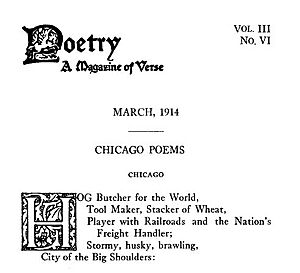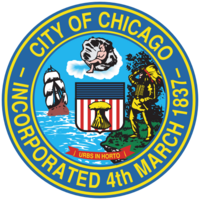Nicknames of Chicago facts for kids
Chicago, Illinois, is a very famous city in the United States, and like many big cities, it has lots of different nicknames! These nicknames often tell us something interesting about the city's history, its people, or even its weather. Let's explore some of the most well-known nicknames for Chicago.
Contents
Windy City
Second City
The nickname "Second City" started as a bit of an insult. It came from a writer named A. J. Liebling who wrote articles for The New Yorker magazine in the 1950s. He later put these articles into a book called Chicago: The Second City. Liebling didn't really like Chicago and compared it to his hometown, New York City. He felt Chicago was losing its importance and had problems with its economy and old ways of thinking.
Even though it started as an insult, a famous improv comedy group in Chicago decided to use the name The Second City for their group, showing they could laugh at themselves! Later, in 2011, Chicago tried to change the idea behind the name by using the slogan "Second to None," meaning it was the best. This slogan was changed again in 2022.
Some tour guides tell a different story about this nickname. They say it refers to Chicago being rebuilt after the terrible Great Chicago Fire in 1871, as if it became a "second" city after the first one burned down.
Chi-town
"Chi-town" is a popular nickname for Chicago. It's made by taking the first part of "Chicago" ("Chi") and adding "-town" to it. This is a common way to make nicknames for cities, like "H-Town" for Houston.
Many famous people have used "Chi-town" in songs and other works, like C. W. McCall's song "Convoy." However, whether people who actually live in Chicago use this nickname a lot is something people disagree about. A writer named Wendy McClure once said it's like "cilantro of nicknames"—some people love it, and some don't!
You'll often see "Chi-town" used by sports teams or for big events. For example, there's a hockey team called the Chi-Town Shooters, a wrestling event called Chi-Town Rumble, and a New Year's Eve party called Chi-Town Rising.
City of Big Shoulders
This nickname comes from a famous poem written in 1914 by Carl Sandburg called "Chicago." In the poem, Sandburg describes Chicago as "stormy, husky, [and] brawling." When he calls it the "City of Big Shoulders," he means that Chicago is a strong, hardworking city, full of people who get things done.
The poem also mentions other nicknames that show what Chicago was famous for back then, like its meat-packing industry and its busy railroad industry. Sometimes, people also say "City of Broad Shoulders."
Chiberia
"Chiberia" is a clever nickname that combines "Chicago" with "Siberia," a very cold region in Russia. This name was first used by Richard Castro, a meteorologist (a weather scientist) for CBS Chicago. He coined it during a very cold time in 2014, when Chicago had some of its coldest temperatures in decades.
The National Weather Service even used the hashtag "#Chiberia" when they were reporting on the extreme cold. People still use this nickname today whenever Chicago experiences really cold weather, like in 2017 and 2019.
Chiraq
"Chiraq" is a nickname that mixes "Chicago" and "Iraq." It's a controversial name because it compares Chicago to a place that has seen a lot of conflict. Some people started using this nickname around the end of the Iraq War.
A reporter named Chuck Goudie once pointed out that the number of people killed in Chicago during a certain period was similar to the number of U.S. soldiers killed in Iraq during the same time. This comparison helped make the nickname more widely known.
The nickname became more popular over time. For example, director Spike Lee used it as the title for his 2015 film, and the rapper Lil Reese used it in his 2013 song "Traffic." The online dictionary Urban Dictionary even added it as an entry in 2012.
City in a Garden
Back in the 1830s, the government of Chicago chose a special motto for the city: "Urbs in Horto." This is a Latin phrase that means 'City in a Garden.' You can see this motto on the city's official seal.
Later, in 1934, the Chicago Park District (the group that manages all the parks in Chicago) adopted its own seal. It has a similar Latin phrase, Hortus in Urbe, which means 'Garden in a City.' Both mottos show how important green spaces and nature are to Chicago.
Great Commercial Tree
This nickname comes from the lyrics of the state anthem of Illinois. The song says: "... Till upon the inland sea, stands thy great commercial tree..." This line describes Chicago as a very important center for business and trade, like a strong, tall tree that supports many branches of commerce.
Other nicknames
- "Mud City" – This might be the oldest nickname for Chicago! It refers to how the city's land used to be very muddy and flat.
- "City by the Lake" – This nickname has been used since the 1890s and simply describes Chicago's location right next to Lake Michigan.
- "The City that Works" – This was a slogan used when Richard J. Daley was mayor. It meant that Chicago was a hardworking city, known for its blue-collar workers, and that everything ran smoothly.
- "Heart of America" – Chicago is one of the biggest transportation hubs in the United States, meaning many roads, trains, and flights go through it. It was also once located near the very center of the country.
- "The Great American City" – This name comes from a book by the famous writer Norman Mailer in 1968. He called Chicago "the great American city." Later, a researcher named Robert J. Sampson also explored the idea that Chicago is a perfect example of an American city in his book Great American City: Chicago and the Enduring Neighborhood Effect.
- "The City Beautiful" – This nickname refers to a movement called the City Beautiful movement, which aimed to make cities more beautiful and organized. This movement was inspired by the World's Columbian Exposition held in Chicago in 1893. You might hear this nickname used by sports announcer Hawk Harrelson when the Chicago White Sox play a game.
- "The 312" – This is a simple nickname that refers to Chicago's original area code for phone numbers. Later, other area codes like 773 and 872 were added.
- "Paris on the Prairie" – This name comes from a famous plan for Chicago created by Daniel Burnham. It suggests that Chicago could be as beautiful and grand as Paris, but located on the American Prairie.
See also
- List of city nicknames in Illinois
- List of songs about Chicago
- Lists of nicknames
 | Jackie Robinson |
 | Jack Johnson |
 | Althea Gibson |
 | Arthur Ashe |
 | Muhammad Ali |



